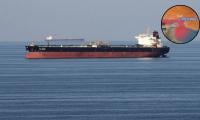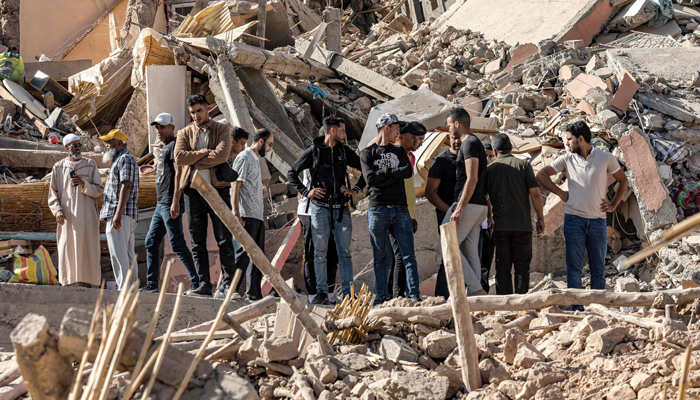Morocco rescuers scour rubble for survivors
Earthquake struck 72 kilometres southwest of Marrakesh, wiping out entire villages in hills of Atlas mountains
TAFEGHAGHTE, Morocco: Using heavy equipment and even their bare hands, rescuers in Morocco on Sunday stepped up efforts to find survivors of a devastating earthquake that killed more than 2,000 people and flattened villages. The first foreign rescuers flew in to help after the North African country’s strongest-ever quake killed at least 2,012 people and injured more than 2,000, many seriously, according to the official figures.
Friday’s 6.8-magnitude quake struck 72 kilometres southwest of the tourist hub of Marrakesh, wiping out entire villages in the hills of the Atlas mountains.
On Sunday an aftershock of magnitude 4.5 rattled already-traumatised residents in the same region. The mountain village of Tafeghaghte, 60 kilometres from Marrakesh, was almost entirely destroyed, an AFP team reported, with very few buildings still standing.
Amid the debris, civilian rescuers and members of Morocco’s armed forces searched for survivors and the bodies of the dead. AFP saw them recover one body from the ruins of a house. Four others were still buried there, residents said.
“Everyone is gone! My heart is broken. I am inconsolable,” cried Zahra Benbrik, 62, who said she had lost 18 relatives, with only the body of her brother still trapped. “I want them to hurry and get him out so I can mourn in peace,” she said. Many houses in remote mountain villages were built from mud bricks. In the village of Amizmiz, near Tafeghaghte, a backhoe dragged away the heaviest pieces of rubble before rescuers dug into the dusty debris with their bare hands to remove a body that appeared to be under a quilt. The two villages lie in Al-Haouz province, site of the quake epicentre, which suffered the most deaths, 1,293, followed by Taroudant province with 452 lives lost, authorities reported. Citizens on Sunday rushed to hospitals in Marrakesh to donate blood to help the injured.
Spain’s defence ministry said an A400 airlifter took off from Zaragoza with 56 rescuers and four search dogs headed for Marrakesh to “help in the search and rescue of survivors”.
“We will send whatever is needed because everyone knows that these first hours are key, especially if there are people buried under rubble,” Defence Minister Margarita Robles told Spanish public television. Many residents of the usually bustling tourist hotspot of Marrakesh spent a second night sleeping on the streets, huddled together under blankets and among bags filled with their belongings. One of them, Fatema Satir, said many stayed outside for fear of their houses collapsing. “There is no help for us,” Satir said. “Our houses have been cracked, others destroyed -- like my daughter´s house which was wiped out. We are in a chaotic state.”
In the city’s historic Jemaa el-Fna square, about 20 people were huddled on the ground, wrapped in blankets, while others stayed on the lawn of the nearby town hall, its 12th-century ramparts partially collapsed.
The kingdom declared three days of national mourning, and a prayer for the quake victims was to be held Sunday in all of the kingdom’s mosques. Morocco’s interior ministry said on Saturday evening that authorities are “mobilised to speed up rescue operations and evacuate the injured.” In addition to Spain, several countries offered aid. French President Emmanuel Macron said his country has mobilised “all technical and security teams to be able to intervene, when the Moroccan authorities deem it useful.”
The United States said it also had search-and-rescue teams ready to deploy, and Pope Francis on Sunday again expressed support for those affected by the disaster. “I thank the rescuers and all those who are working to alleviate the suffering of the people,” he said from the Vatican window above St Peter’s Square.
Algeria, which has long had tense relations with neighbouring Morocco, opened its airspace, which had been closed for two years, to flights carrying humanitarian aid and evacuating the injured. Israeli Prime Minister Benjamin Netanyahu, whose country in 2020 established ties with Morocco, offered to send search-and-rescue teams, declaring that “Israel stands by Morocco in its difficult time”.
The Red Cross warned that it could take years to repair the damage. “It won’t be a matter of a week or two... We are counting on a response that will take months, if not years,” said Hossam Elsharkawi, its Middle East and North Africa director.
The quake was the deadliest in Morocco since a 1960 earthquake destroyed Agadir and killed more than 12,000 people.
-
 Strait Of Hormuz Turmoil: Gulf Shipping Crisis Raises Fears Of Global Food Price Shock
Strait Of Hormuz Turmoil: Gulf Shipping Crisis Raises Fears Of Global Food Price Shock -
 Sarah J Maas Makes Exciting Announcement For ‘Acotar’ Series
Sarah J Maas Makes Exciting Announcement For ‘Acotar’ Series -
 Teyana Taylor Makes Shocking Claim About 'One Battle After Another': 'Very, Very Real'
Teyana Taylor Makes Shocking Claim About 'One Battle After Another': 'Very, Very Real' -
 Qatar Airways To Operate Relief Flights From Muscat And Riyadh For Stranded Travelers Amid Global Turmoil
Qatar Airways To Operate Relief Flights From Muscat And Riyadh For Stranded Travelers Amid Global Turmoil -
 2026 Pro-Human AI Declaration: How Humanity Can Control Artificial Intelligence
2026 Pro-Human AI Declaration: How Humanity Can Control Artificial Intelligence -
 Lewis Hamilton Vows To 'put More Work In' As He Gears To Return For 2026 Formula 1 Season
Lewis Hamilton Vows To 'put More Work In' As He Gears To Return For 2026 Formula 1 Season -
 Sarah Ferguson Watches Beatrice, Eugenie Struggle For Parents: ‘She Could Finally Release It’
Sarah Ferguson Watches Beatrice, Eugenie Struggle For Parents: ‘She Could Finally Release It’ -
 Father Takes Major Action Against Google Over Son’s Death
Father Takes Major Action Against Google Over Son’s Death -
 Everything We Know About Michael Sheen’s 'You Told Us To Talk About The Weather'
Everything We Know About Michael Sheen’s 'You Told Us To Talk About The Weather' -
 Jodie Sweetin Breaks Silence On Her Bond With Candace Cameron Bure: 'Not Gonna Hug'
Jodie Sweetin Breaks Silence On Her Bond With Candace Cameron Bure: 'Not Gonna Hug' -
 Indonesia Slams Meta Over Rising Disinformation And Online Gambling Content
Indonesia Slams Meta Over Rising Disinformation And Online Gambling Content -
 Rockstar Pulls GTA 6 From Store After Surprise Leak: Here’s Why
Rockstar Pulls GTA 6 From Store After Surprise Leak: Here’s Why -
 Brooklyn Beckham Reacts Negatively To Birthday Tributes From David, Victoria
Brooklyn Beckham Reacts Negatively To Birthday Tributes From David, Victoria -
 Nicola Coughlan Makes Major Claim Over ‘plus Size’ Label
Nicola Coughlan Makes Major Claim Over ‘plus Size’ Label -
 Senate Prioritizes Housing As Crypto Bill Hits New Impasse, Stalling Trump’s ‘Clarity Act’ Agenda
Senate Prioritizes Housing As Crypto Bill Hits New Impasse, Stalling Trump’s ‘Clarity Act’ Agenda -
 China Unveils ‘childbirth-friendly Society’ Plan To Reverse Demographic Decline
China Unveils ‘childbirth-friendly Society’ Plan To Reverse Demographic Decline




